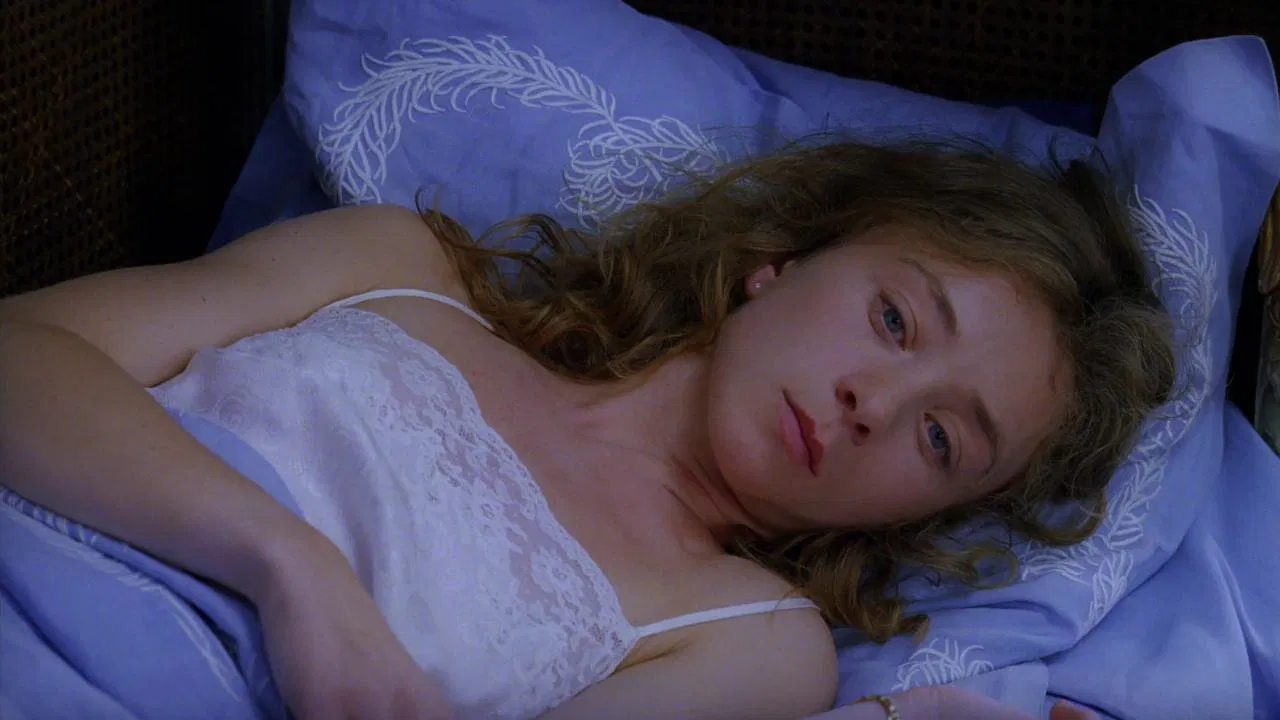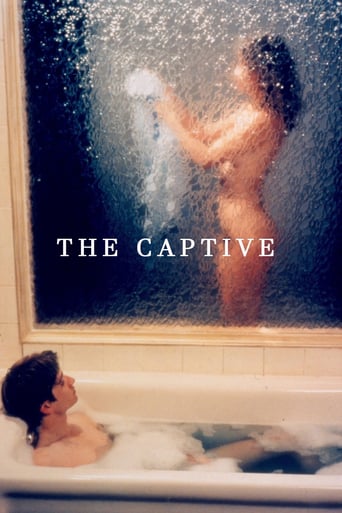

Because of its complex and introspective nature, the works of the great French novelist Marcel Proust have been difficult to translate to the screen in spite of some very fine attempts by Raul Ruiz and others. Chantal Akerman's La Captive is no exception. Inspired by the fifth of seven volumes of Proust's epic novel In Search of Lost Time, the film captures the obsessive quality of the relationship between Simon (Stanislaus Merhar) and Ariane (Sylvie Testud) (Marcel and Albertine in the novel), but is unable to project onto the screen the novel's exquisite prose, psychological subtlety, or depth of feeling. While Simon is given a thoughtful treatment, he comes across more as strange and unpleasant than the deeply sensitive, poetic young man of the book.La Captive begins at home with Simon viewing films of Ariane and some friends during their summer together in Normandy. Repeatedly viewing the footage, he carefully utters the words "I really like you," but it is unclear if the sentiment is his, or if he is vocalizing what he imagines to be the thoughts of his mistress. Set in Paris, Akerman updates the story from its turn of the century milieu and transports it to the modern era with automobiles and well-lit boulevards filled with traffic replacing the horse and carriage. Simon is a somber, well-to-do young man who lives in an ornate Paris apartment with his grandmother (Francoise Bertin), housekeeper Francoise (Liliane Rovére), and girlfriend Ariane (Sylvie Testud).Though they claim to love each other, each keeps their distance. Ariane lives in an adjacent room and only comes to see Simon when he sends for her in an ongoing ritual. Dialogue is sparse and mostly consists of Simon asking Ariane questions that elicit noncommittal responses such as "if you like," "I can't say," or "you think so?" Mimicking Bressonian models, the actor's facial expressions range from enigmatic to blank, and, aside from some perfunctory kissing, the only time that passion shows up is when Simon rubs up against Ariane's body while she is asleep (or pretending to be). When Simon demands to know what Ariane is thinking, she replies, "If I had any thoughts, I'd tell you—but I don't." Some situations would be comical if they were not sad. As Simon watches Ariane from an adjoining bathroom while sitting in his tub, he tells her how much he admires the odors between her legs and says that if it weren't for his illnesses, he would rather that she would never wash. On another occasion, he probes to find out the number of lies she has told him, insisting that two lies are not enough, he wants at least four. The jealous and insecure Simon has accumulated evidence in his own mind that Ariane is physically attracted to women but it is not made clear (either in the novel or the film) whether his suspicions are real or imagined.Nonetheless, Simon is preoccupied by the part of Ariane's life that he believes she is withholding from him, following her in an art gallery and physically removing her from a performance of Carmen at the Trocadero out of his fear of her friendship with the actress Lea (Aurora Clément). When Simon is unable to leave the house because of an asthmatic condition, he assigns their mutual friend Andrée (Olivia Bonamy) to track her whereabouts and report back to him. He even goes so far as to question lovers Sarah (Bérénice Bejo) and Isabelle (Anna Mouglalis) about what they think about when they make love.Although the characterizations in La Captive are very real and quite haunting, the film covers only a small portion of Proust's fifth volume, omitting the colorful characters that make it so special: Charlus, Morel, the Verdurin's, Brichot, and Mme de Guermantes to name a few, and there is no hint of the music, society, and themes of memory, nature, and awareness of time and place that dominate the narrative. Though the pacing is deliberately slow to capture the enigmatic quality of the relationship, the film, while absorbing, is static and does not draw us deeply enough into its mysteries to compensate for its dramatic inertness.
... View MoreAkerman's "La Captive" sticks in the memory. I think it must be its meditative force, and its very concrete means of expressing some truths about men and women.The title most assuredly gets delivered--in every scene, in every word, in every image. Ariane is viewed, desired, captured. Simon first possesses her as an image in a private video of a group of lesbians enjoying themselves on a beach. He then, like a detective or spy, puts his "love" object under direct surveillance, and takes her into his luxurious apt establishing her as he would say his comfortable tub, or his bed, to satisfy his longings.Thus it is that Ariane, simply be being female, arouses in Simon sex or sexual erection, predation, and bondage. But she is no prisoner of place--no, she is rather a prisoner on a leash. She is free to leave the periphery, free to be watched, stalked, inquisited, pounced upon , and retracted to service as a sexual prop and pliant companion.Her lesbian circle, her social life remain open to her because they spark Simon's objectifying sexuality. He needs the danger of her rejection to challenge and thus intensify his control over her. He needs to know his charmer, from inside out. Is lesbian love superior to his love? Does Ariane secretly scorn him? He needs to know her deepest secrets, in order to win her total dependency. For it is not her body, her budding innocence, her slimly fashionable doll-like persona, nor even her seductive sleep that is his primary interest, but rather her literal self. This is the only booty that will satisfy his quest for male identity.Ariane in short is no more than a fetish. She's been deprived of her vivid community, her lesbianism, and her emotional landscape. She cannot be herself because she has shrunk in captivity, and because she has become accustomed to captivity. That's what he's done to her, because it is her thoughts and her feelings that he needs to own.But ironically, he needs to know all about someone who knows nothing worth knowing. It has all gone from her as in amnesia. Full submission means going blank, so Ariane cannot answer any of Simon's prying questions. To respond to Simon's "love" she has had to become a thing--but not completely. She has saved some of herself for herself.And in the end, her self-containment cracks. Ariane's single passionate moment returns her to the sea, to the scene of her capture, and far more importantly to the actual place of her pre-captive life--and to her strong swimming , and to the physical strength to resist further imprisonment.
... View MoreI'm currently studying Proust, and so looked forward to this. I figured the other review HAD to be wrong about how bad this was. But they weren't! I love slow, ponderous French movies. But this one absolutely killed me, bludgeoned me with a big fat dull fence post and left me by the side of one of the many long roads I'd watched the actors drive interminably and wordlessly down. I finally had to watch it on fast forward, because NOTHING HAPPENS time and time and time again for minutes at a stretch. I don't envy a director/scriptwriter who takes Proust on, because so much of the richness of his characters and stories is interior. But, God! You've got to at least TRY to convey those depths by something other than static shots of actors doing and saying nothing. Boo. Hiss. Just awful.
... View MoreSo many loud and shouting films, so much moving. This movie makes you calm down and should make you think. Aside from the literary background, which I didn't know when watching the movie, I found La Captive very intense and inspiring. If you are in a depressed state of mind, it might not be the right movie to watch. But anyway, then there is at least the great acting and the beautiful camera. My companion wanted to leave, but I resisted and it was worth it.
... View More